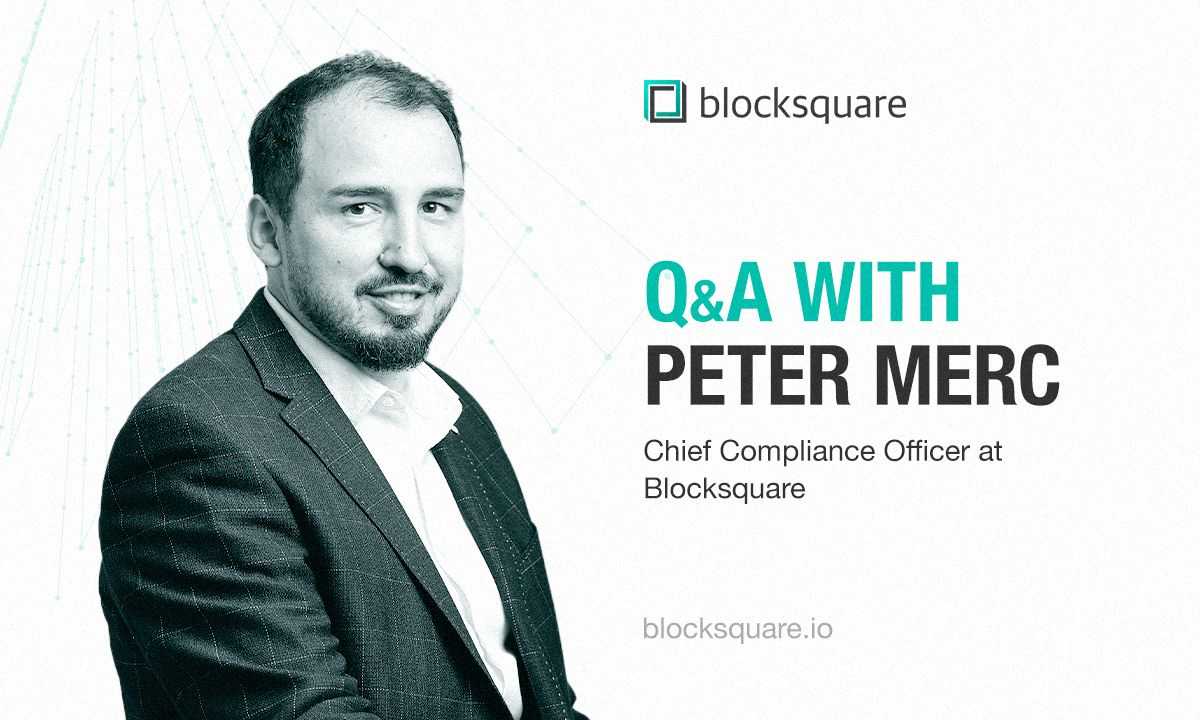Addressing Community FAQs with Peter Merc, Chief Compliance Officer at Blocksquare
Demystifying MiCA Regulations and Compliance: Your Top Questions Answered.


In an insightful internal conversation within the Blocksquare team, we discuss the most frequently asked questions from our community with Peter Merc, Chief Compliance Officer. Gain unique insights into how Blocksquare is preparing for the upcoming MiCA regulations and ensuring compliance while maintaining transparency and trust with our valued community members. Join us as we provide answers to the questions that matter most to you.
What are the plans for Blocksquare with MiCA regulations coming in next year?
Blocksquare is a tech infrastructure provider for the tokenization of properties. The tokenization platform is offered to certified partners. These use Blocksquare's infrastructure for the tokenization of real estate assets. A licensing agreement is signed between Blocksquare and each certified partner for the use of the platform.
In such a structure, MiCA provisions addressed to crypto-assets issuers do not apply to Blocksquare. They apply to certified partners as token issuers. In this respect, we plan to support our certified partners in ensuring full legal compliance with the applicable MiCA provisions by preparing guidelines and template documents and in offering support in the correspondence with the competent authorities.
There are some other MiCA provisions that will most probably be applicable directly to Blocksquare (e.g., service of placing of crypto assets). These provisions will be in force from 2025 on. We will be in full legal compliance with these provisions before that.
Does Blocksquare Require Legal Permission for Property Tokenization and Transactions? Where Can I Find Documentation of Regulatory Compliance?
Blocksquare is a tech infrastructure provider for the tokenization of properties. The tokenization platform is offered to certified partners. These use Blocksquare's infrastructure for the tokenization of real estate assets. A licensing agreement is signed between Blocksquare and each certified partner for the use of the platform.
In such a structure, there is no applicable regulation for Blocksquare since Blocksquare qualifies as a software provider. On the other hand, certified partners act as token issuers, and regulation applies to them. What kind of regulation is applicable is the matter of the jurisdiction from which the issuer operates. For now, the anti-money laundering legislation is applicable (e.g., mandatory KYC). In the near future (end of 2024), MiCA, as a systemic crypto regulation, will step into force, and a regulatory framework for the so-called asset-referenced tokens will step into place.
Understanding the Classification of Tokens and NFTs as 'Securities': Are BSPT Tokens Considered 'Securities' and Could This Pose Challenges for Blocksquare and Token Holders?
Blocksquare is a tech infrastructure provider for the tokenization of properties. The tokenization platform is offered to certified partners. These use Blocksquare's infrastructure for the tokenization of their real estate assets. A licensing agreement is signed between Blocksquare and each certified partner for the use of the platform.
There is no applicable regulation for Blocksquare in such a structure since Blocksquare qualifies as a software provider. On the other hand, certified partners act as token issuers, and regulation applies to them.
How the BSPT tokens qualify in a specific jurisdiction depends on the existing local regulation. We believe that under future EU regulation (MiCA), BSPT tokens will qualify as asset-referenced tokens. Issuing such tokens will fall under MICA, not MiFID2 (EU regulation for securities).
We advise every certified partner to approach the competent authority before issuing a token. Blocksquare did the same when we started a pilot project a few years ago. We completed the transaction once we got confirmation from the Securities Agency that BSPT tokens would not qualify as securities but as utility tokens.
At Blocksquare, we plan to support our certified partners in ensuring full legal compliance with the applicable MiCA provisions (and with legal requirements from countries outside the EU) by preparing guidelines and template documents and in offering support in the correspondence with the competent authorities.
Questions regarding the following paragraphs: "Loan and Collateral"
as addressed in Blocksquare's recent announcement about the first ever notarization of a tokenized real estate asset.
"One inherent challenge with a corporate resolution is its potential vulnerability. Even with its protective clauses, there's no absolute guarantee that the company owning the real estate asset will fully honor it. Such discretion poses a significant risk to investors. Imagine a scenario where tokens have been issued, the initial corporate resolution adopted, and tokens purchased. If, for unforeseen business reasons, the company fails to uphold the resolution, either partially or entirely, it could compromise the economic and legal standing of every token holder. This could necessitate legal action against the property owner, potentially leading to protracted and expensive litigation. To bolster the protection of token holders - ensuring that any breach of the corporate resolution by the real estate owner becomes either too challenging or costly - we've instituted a loan agreement. This agreement is between the marketplace operator (in this case, Blocksquare) and the real estate asset owner. Here, Blocksquare serves as the issuer and lender of Blocksquare Property Tokens (BSPT tokens designated for a specific real estate transaction), while the real estate owner assumes the role of the borrower."
The loan's essence is the BSPTs.
Community Questions:
"The borrower pledges the property as collateral, enabling a charge to be placed on its title in favor of the lender. This loan agreement is notarized and subsequently registered with the Land Registry."
Is "the company owning the real estate asset" the same as "the property owner"?
Yes, it is the same.
Is "the property owner" the same as the "real estate owner"?
Yes, it is the same.
Is "the borrower" the same as "the company owning the real estate asset"
Yes, it is the same.
Who send the property tokens to investors on the primary market? The property owner (the entity) or the marketplace operator (like Blocksquare)?
The marketplace operator on behalf of the property owner. Once tokens are generated and the loan structure is established (mortgage in the land registry), tokens are deposited by the market operator directly to the wallets of the investors. Investors provide their wallets as a part of KYC procedure on the platform.
Who is the token issuer? The marketplace operator (like Blocksquare) or the property owner (or the company)?
Blocksquare is a tech infrastructure provider for the tokenization of properties. The tokenization platform is offered to certified partners. These use Blocksquare's infrastructure for the tokenization of real estate assets. A licensing agreement is signed between Blocksquare and each certified partner for the use of the platform. As such, market operators (certified partners) are token issuers, and Blocksquare is software (platform provider).
Summary:
In this Q&A, we covered key questions about Blocksquare's plans for MiCA regulations, compliance, and the classification of tokens. We clarified terms like "the company owning the real estate asset," "the property owner," and "the borrower."
Blocksquare acts as a tech infrastructure provider, and marketplace operators are the token issuers. The interview highlighted Blocksquare's commitment to supporting certified partners and ensuring regulatory compliance in an ever-evolving landscape.